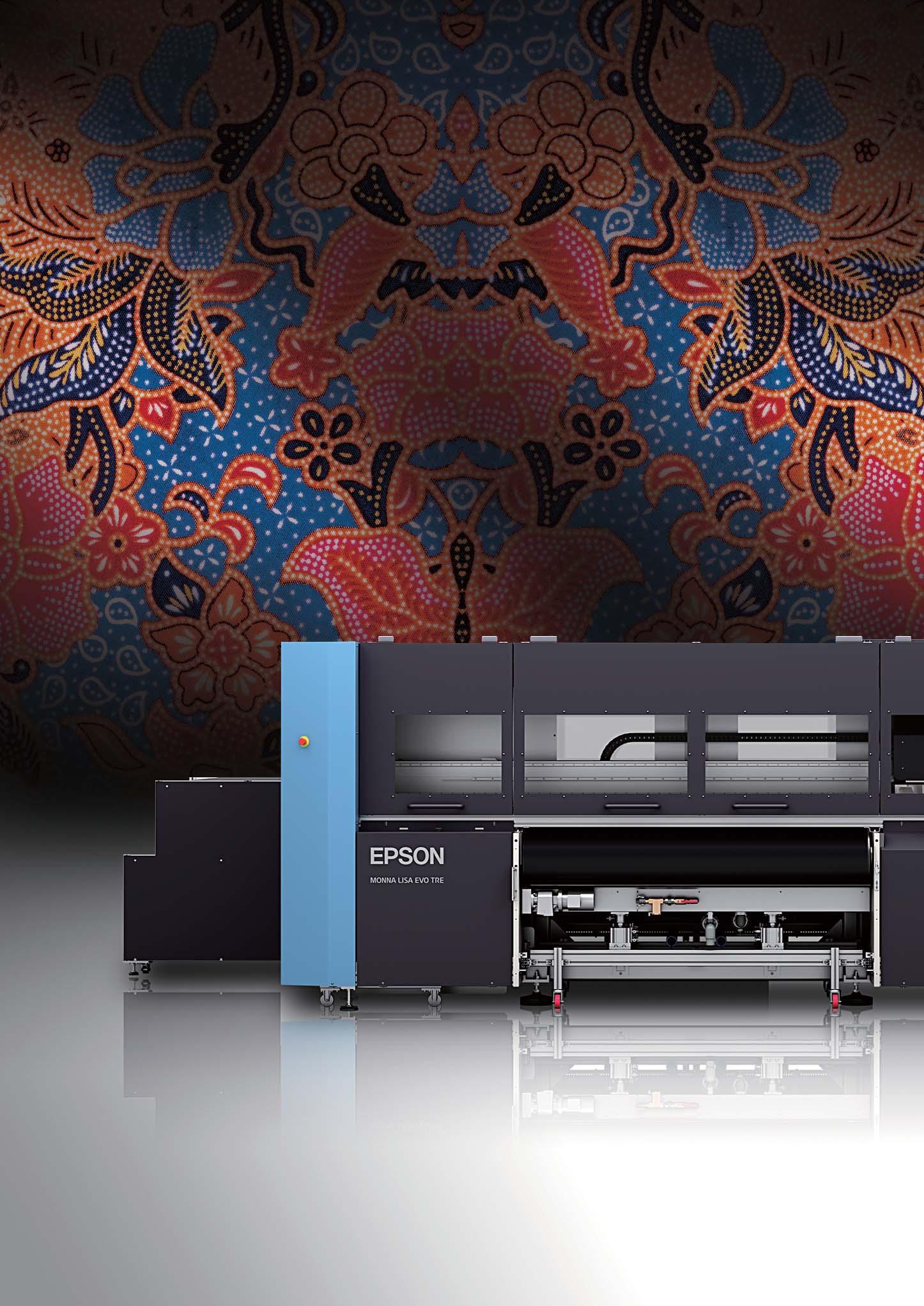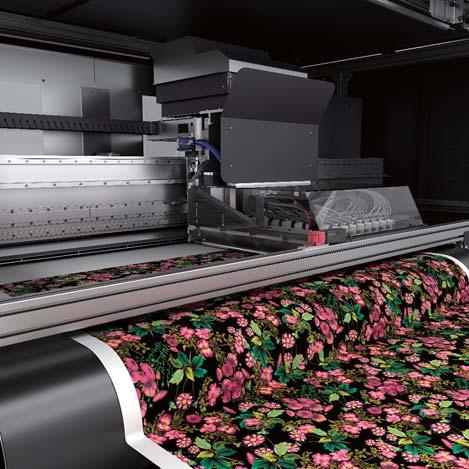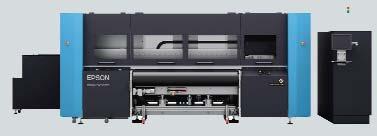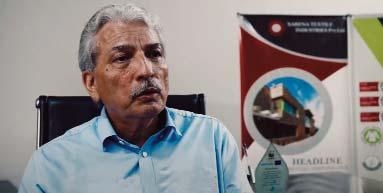
6 minute read
Epson Monna Lisa: Advancing the digitalisation of industrial textile printing through greater flexibility and sustainability
The global health crisis has forced industries to adapt to the new normal as they quickly pivoted to online and hybrid working. With the accelerated pace of digitalisation, those that were quicker to adopt digital solutions and processes in their operations were able to continue business as usual and thrive in the new normal.
The textile production industry was not spared from the economic effects of the pandemic as fashion retail chains and other textile-related retail businesses were forced to close their physical stores in line with strict health protocols. The challenges are further aggravated by the increasing costs of exporting and importing caused in part by the ongoing trade war between China and the US.
Advertisement
For textile printing-related businesses, thriving in the new normal meant leveraging technology to make operations in an agile work environment sustainable. It also meant keeping costs down without sacrificing quality output. These conditions were ripe for the adoption of digital textile printing technology across businesses.
In fact, in the area of textile production, a Future Market Insights report revealed that the increase in preference of direct to fabric printing technology on a wide range of fabrics will continue to assist the growth of the digital textile printing market over the projection period, until 2029 .
The benefits that digital textile printing offers business owners in the new work environment make it the natural smart option: it allows for shorter production runs, reduces the need to stock inventory, enables quicker delivery to market, and allows production to be remotely controlled, making it less manpower-dependent and best suited to the new agile work environment.
Predicting the shifting preference toward digital printing as a solution, Epson developed a suite of products that leveraged technology to enable more productive, more consistent, and more cost-efficient operations with high quality output. By listening to customers, Epson developed solutions that would improve customer workflows and target their major pain points brought about by recent challenges.
The digitalisation of textile printing operations and processes from analog to digital comes with the benefits of reduced operational costs, improved accessibility, and business continuity.
Epson Total Solution
As a digital textile printing technology pioneer, Epson recently introduced its Monna Lisa Evo Tre 32 industrial digital textile printer based on Total Solution, a fully integrated system where all components belong to the same process to guarantee vivid, high-quality printed textiles that stand out from the others. The Monna Lisa Evo Tre 32 combines performance and usability to meet the needs of the digital textile market for flexibility, which is vital for operations during the pandemic.
Epson offers complete end-to-end solutions in digital textile printing which include print-heads, inks and software all designed to work smoothly and seamlessly. From pre-treatment to colour management, sample printing, and post-printing steps, Epson ensures that it provides businesses and partners the needed solutions for digital textile printing. Epson Total Solution comes from the collaboration of Epson’s inkjet printing technology with the engineering by F.lli Robustelli and pre/posttreatment and inks by For.Tex–two companies that are now part of the Epson Group.




The Monna Lisa Evo Tre is the cutting edge Direct-to-Fabric printer that will bring production efficiency to a whole new level. It delivers superior print quality and high accuracy through Epson’s very own precision dot technology and PrecisionCore 4chip print-heads.
Epson’s advanced PrecisionCore technology is the outcome of constant research and development to achieve greater efficiency, quality, and reliability in Direct-to-Fabric printing, This technology makes Epson’s Monna Lisa range one of the most versatile digital textile printers in the market today.
The Monna Lisa Evo Tre is a next-generation digital textile printer with high print quality, productivity, stable operation with minimal downtime, and allows easy operation for an affordable price, making it the ideal printer for companies looking to move into digital printing.
To further strengthen its digital textile printer line, Epson will launch its first 64-head direct-to-fabric printer, the ML-64000, in Pakistan and Southeast Asia later this year. This new model offers high productivity and high print quality for manufacturers shifting from analogue to digital textile printing and looking to expand their offering in the fast fashion industry.
Eco features for greater sustainability
Since the digital textile printing process is shorter and does not require printing plates, it uses less energy and water than a traditional analog process and wastes far less ink. Driving efficient inventory management, digital textile printing minimises inventory losses associated with materials, partly finished and finished products, from production through distribution and sale.
Epson’s digital textile printer inks have acquired Eco Passport by OEKO-TEX® certification, indicating that they meet international safety standard for chemical substances of textiles.
Bottom Line
Businesses in the fashion industry look for flexible solutions to help them meet client demands. Epson’s Monna Lisa series provides users with the choice of a single printer to meet a variety of different production needs. It can print on any type of fabric with speed and precision to show even the smallest detail.
Epson’s Monna Lisa series has a complete and integrated system that offers maximum assistance throughout the production cycle. There is a single supplier for all components: print-head, inks, before and after chemical treatment, and engineering support.
We are one the few companies in textile in Pakistan which has an entire research and development department headed by a general manager. One of the reasons we went for the digital printing was because that was a new process. It was the need of the time. The kind of quality and the kind of perfection that digital printing gives to our designs is not possible in tratitional types of printing that we will do for design perfection and versatility. I can make a hundred colour design with digital but I can’t do that with rotary or flatbed.
We can produce anywhere from one thousand meters a day to five thousand meters a day depending on the kind of quality that we want and the requirement of the customer.
As a company we are extremely concerned about the environment and throughout eighteen years of our existance we have been very particular that we do not pollute the environment. We put up a water reprocessing plant to clean the water that we put into the drains. It’s all keeping it with the philosophy that we have. Right from day one it has always been excellence, which is the first priority.
It was again our quest for improvement that we got the Epson printer. One thing we have had from Epson printers is excellent service. That is something that is always important in a long-term relationship. And for that we are very happy because you always want to work with a company which gives you the best service. And with that vision we always want to go for a company that makes the top quality.
Hamid Zaman, Managing Director, Sarena Textile Industries (Pvt) Ltd.











